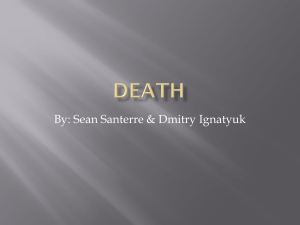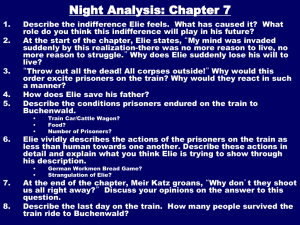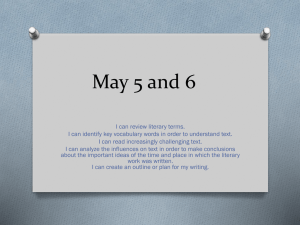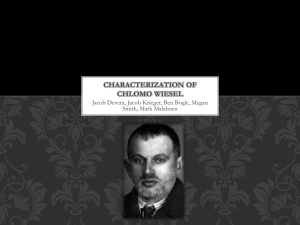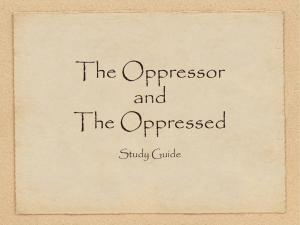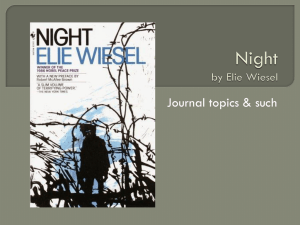Night Study Guide Answers
advertisement
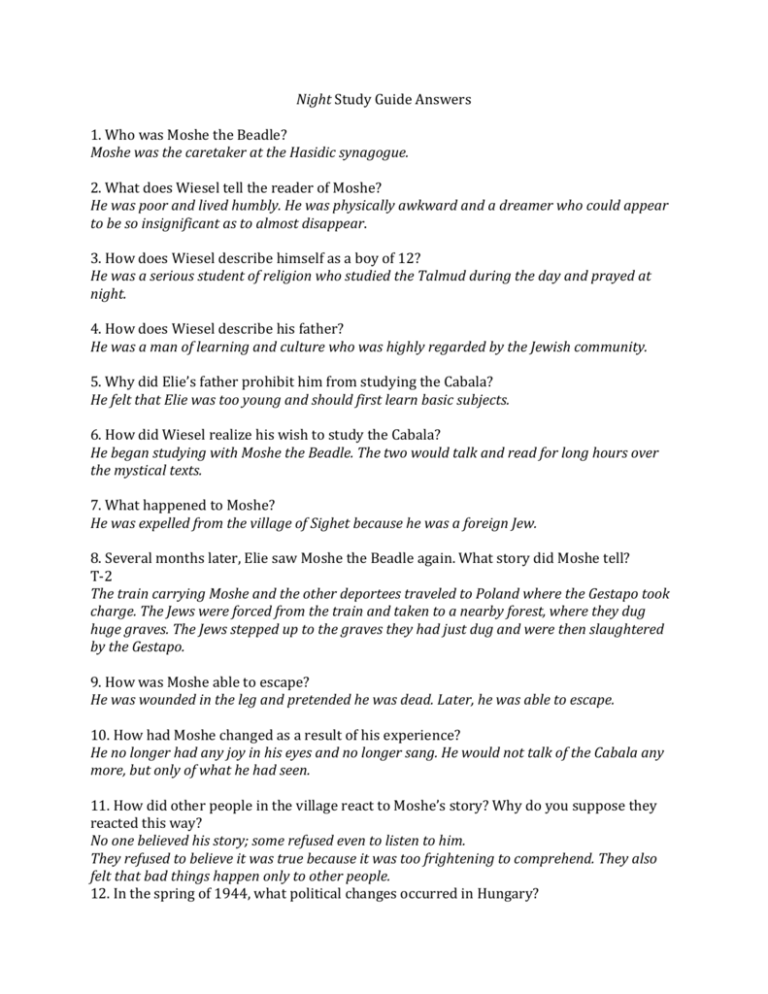
Night Study Guide Answers 1. Who was Moshe the Beadle? Moshe was the caretaker at the Hasidic synagogue. 2. What does Wiesel tell the reader of Moshe? He was poor and lived humbly. He was physically awkward and a dreamer who could appear to be so insignificant as to almost disappear. 3. How does Wiesel describe himself as a boy of 12? He was a serious student of religion who studied the Talmud during the day and prayed at night. 4. How does Wiesel describe his father? He was a man of learning and culture who was highly regarded by the Jewish community. 5. Why did Elie’s father prohibit him from studying the Cabala? He felt that Elie was too young and should first learn basic subjects. 6. How did Wiesel realize his wish to study the Cabala? He began studying with Moshe the Beadle. The two would talk and read for long hours over the mystical texts. 7. What happened to Moshe? He was expelled from the village of Sighet because he was a foreign Jew. 8. Several months later, Elie saw Moshe the Beadle again. What story did Moshe tell? T-2 The train carrying Moshe and the other deportees traveled to Poland where the Gestapo took charge. The Jews were forced from the train and taken to a nearby forest, where they dug huge graves. The Jews stepped up to the graves they had just dug and were then slaughtered by the Gestapo. 9. How was Moshe able to escape? He was wounded in the leg and pretended he was dead. Later, he was able to escape. 10. How had Moshe changed as a result of his experience? He no longer had any joy in his eyes and no longer sang. He would not talk of the Cabala any more, but only of what he had seen. 11. How did other people in the village react to Moshe’s story? Why do you suppose they reacted this way? No one believed his story; some refused even to listen to him. They refused to believe it was true because it was too frightening to comprehend. They also felt that bad things happen only to other people. 12. In the spring of 1944, what political changes occurred in Hungary? The Fascist, or Nazi, Party was in power, and German troops had entered Hungarian territory. 13. What was the attitude of the Jews of Sighet? At first they were anxious, but were soon optimistic again. They continued to deny the reality of what was occurring around them. 14. What literary device does Wiesel employ to emphasize the foolish optimism and denial of facts of the Jews living in Sighet? How is it used? Irony. For example, the townspeople ask each other, “Where is their [the Nazi’s]famous cruelty?”Another example is, “The Jews of Sighet continued to smile.” Both Wiesel and the reader know very well how cruel the Germans were. The fate of the Jews has already been set, and all they can do is smile and hope that it all goes away. 15. After the Germans arrived in Sighet, what was the prevailing attitude among the residents? The Germans behaved politely at the beginning of the occupation, so the people believed that nothing further would happen. 16. After Passover, Wiesel says, “the curtain rose.” What does this refer to? What happened? The leaders of the Jewish community were arrested and various restrictions against Jews were enforced, including the decree that every Jew must wear the yellow star. The statement could mean several things. It signified the beginning of the horrible story of the destruction of the Jew acted out on the stage of the town of Sighet. It could also imply that the curtain of denial was removed from the townspeople’s eyes, and they finally began to see the reality of their situation. They were doomed. 17. What was bitterly ironic about the comments that Wiesel’s father made regarding the wearing of the yellow star? The father said in effect that wearing a yellow star cannot kill anyone. Both the reader and the narrator, though, know what comes next. 18. What was the Germans’ next step? Two ghettos were established in Sighet, and every Jew was confined to one of these two areas. 19. How did the Jews react to this? They welcomed such segregation from the anti-Semitism of the Gentile residents of Sighet and considered themselves rather fortunate. They mistakenly assumed that they would remain in the ghetto until the end of the war. 20. The Germans had other plans for the Jews of Sighet, however. What were those plans? The ghettos were to be emptied, and the Jews deported. 21. The Wiesel family were among the last to leave the large ghetto. Where were they sent? The Wiesels were sent to the little ghetto. Several days later, all remaining Jews, including the Wiesels, were transported. 22. Where did they go? The Germans marched them to the train station and forced the Jews to crowd into cattle cars, which were then sealed. 23. Despite all that happened, even after the Germans entered the capital of the Budapest, Wiesel tell us that people still remained optimistic about their future. How can you explain this optimism? Perhaps it is human nature to hope for the best even when our intellect tells us that evil is in the future. 24. In this chapter Wiesel uses images from nature. How does he use the sun? He speaks of the hot summer sun that beats down unmercifully on the people in the street awaiting transport. The sun creates thirst and adds to their misery. 25. What does this imagery of night suggest? “Night. No one prayed, so that the night would pass quickly. The stars were only sparks of the fire which devoured us. Should that fire die out one day, there would be nothing left in the sky but dead stars, dead eyes.” The image suggests the dark night of the soul, a night in which no one can pray. The stars, which are usually thought of pleasant adornments of the night sky, are “sparks of fire which devoured us.” If those stars die out, nothing is left, only dead stars that mirror their own dead eyes. The darkness is, symbolically, going to overwhelm them, the people and the stars. 26. Given the fact that the title of this book is Night, what do you suppose a major theme in this work will be? While the phrasing may vary it should include the idea of the darkness of despair that is accompanied by a loss of hope and possibly a loss of faith. 27. A memoir is a story of one’s life told by the person similar to an autobiography. Describe the tone of this memoir, and speculate on why Wiesel chooses to use this tone. Wiesel uses a great deal of irony to detach himself from the story. He seems to stand back and say “this is the way it was—I am simply giving you the facts.” Given the horrific nature of the subject matter, this may be the only way he can tell the story. He also describes incidents dispassionately, so the facts themselves delineate what happens. 28. Identify each of the steps in the German plan, and point out how the cunning of the German plan and the people’s human need for optimism in the face of danger led the Jews of Sighet to the transports to Auschwitz. The S.S. arrive in Sighet, and initially they appear courteous and non-threatening. The first regulation is merely for soldiers to stay in the residents’ homes for three days. The next regulation requires the Jews to wear yellow stars and prohibits them from going certain places. After, that Jews are required to live in the two ghettoes. At each step the regulations are a burden, but they are a burden that can be lived with; in fact, some even see a positive side to living in a ghetto because they are separated from the hostile stares of the non-Jewish townspeople. Chapter 2 1. After several days of travel, what did the prisoners finally realize? The prisoners realized that they were not going to stay in Hungary. 2. Wiesel’s description of Madame Schächter, “she looked like a withered tree in a cornfield” is an example of what figure of speech? Because two dissimilar things are compared using “like,” this is a simile. This image evokes the image of one who is out of place, alone, old, and dying. 3. What happened to Madame Schächter, and what did she do? She “had gone out of her mind,” and on the third night, she began screaming repeatedly that she could see “a terrible fire…huge flames…a furnace.” (Pgs. 22-23) 4. Madame Schächter’s hysterical screaming of “Fire! Fire” is an example of what literary device? Foreshadowing. It foreshadows the crematoria fires at the death camp of Auschwitz. Like the crazed prophetess of a Greek tragedy, Madame Schächter seems able to foresee the future. 5. How did this affect those in the cattle car with her? They were terrorized. Some even hit Madame Schächter to try to silence her. 6. When the prisoners were finally unloaded from the train, where were they? What was significant about the time? They found they were at Birkenau, the reception center for the Auschwitz concentration camp. It was midnight when they got off the train. With the flames and smell of burning flesh in the air, they must have felt they were in hell. Chapter 3 1. Immediately after the Jews were unloaded from the train, what do the German officers do? They separated the men and women into two groups. 2. The men were then marched before Dr. Josef Mengele. What did he do? What was his purpose? Using a conductor’s baton, he separated the men into two groups by assessing their physical condition and by asking such questions as age, occupation, and overall health; the purpose was to separate those who could work from those who could not. 3. What did another prisoner say would happen to Elie’s group? They were told that their group would be sent to the crematory and burned to death. 4. When some of the younger men wanted to rush the guards, even if they died in the effort, what did the older people counsel? “You must never lose faith…that’s the teaching of our sages.” 5. What did Elie witness while he was standing in line? What was his reaction to what he saw? A truck pulled up to a burning pit and emptied its load of little children into the flames. It was such a horrific sight that he wondered if it was a nightmare and how the world could keep silent. 6. When Elie realized that he and his father may be burned, what plan did he devise? He would run to the electric fence and die by electrocution; this, he felt, would be preferable to being burned alive. 7. The scene of Wiesel and his father approaching the inferno is particularly vivid. How is such artistry achieved? Wiesel varies the pacing throughout the book in order to emphasize certain points. Here, the pacing is quickened by use of short sentence fragments, “Ten steps still. Eight. Seven.” At the same time, tension is dramatically heightened as the time of this brief episode is expanded and broken down into a moment-by-moment experience. The reader races ahead to see what will happen. 8. What did Elie revolt against? He did not believe that he should bless the name of the Lord. Elie believed he had nothing to be thankful for in Auschwitz and that he could not pray to a God who would allow this to happen. 9. One way an author has to effectively emphasize a point is through selective repetition of a word or phrase. What phrase does Wiesel employ to highlight the horror of his first night in the concentration camp? “Never shall I forget…” 10. List the things that Wiesel says he shall never forget. He will remember: “the night, that smoke”; “the little faces of the children”; “those flames that consumed my faith forever”; “that nocturnal silence which deprived me…of the desire to live”; “those moments which murdered my God and my soul and turned my dreams to dust.” 11. Another method of emphasis is through the use of imagery. What images are used frequently throughout Night. Images of night and darkness occur frequently throughout the book. These are symbolic of the darkness of despair, the night of the human spirit. There can be no light in the face of such overwhelming horror. 12. Elie and his father are spared from the flames. What happened to them next in the course of their processing at Auschwitz? They were marched to the barracks, ordered to strip, then dragged off to the barber, where all the hair was shaved from their bodies. Hours later and still naked, the prisoners were run outdoors to a new barracks. They were disinfected, then showered, and finally issued poorly fitting clothes. 13. This marked the end of Elie’s first night at Auschwitz. What natural sign marked the beginning of the next day? What does Elie tells us of the change in himself? With the morning star, he became a completely different person as a result of everything that had happened to him and that he had seen. He was empty; his soul had been devoured by “a dark flame” of hatred and revenge; his belief in God had been stripped from him, and he was no longer an innocent child. 14. Why did Elie berate himself so severely? His father had been struck right in front of him, and Elie only looked on and did and said nothing. 15. Where were Elie and his father marched to? They made the 2-mile march from Birkenau, which acted as a reception/processing center, to the main concentration camp at Auschwitz. 16. What was Elie’s first impression of Auschwitz? He felt it was better than Birkenau since the buildings were made of concrete rather than wood, and there were even small gardens on the grounds. 17. What was unusual about the prisoner in charge of their barracks? He spoke to the prisoners under his control as human beings, the first time since they had arrived at the camp. 18. The next day, the prisoners underwent a last step in their admission process. What was it? Each man’s left arm was engraved with his prison number, and each man was now known by that number only. All individuality, family history, and humanity had been stripped from the men. 19. Who did Elie meet after several days at the camp? A man named Stein, from Antwerp, who was related by marriage to Elie’s father, introduced himself to Elie and his father. 20. What did Stein want? He wanted to know if the Wiesels had any news of his own family. 21. How did Elie respond to Stein’s request for information? Elie lied. He told Stein that his wife and children were well. 22. Since the prisoner in charge of their block was kind, and since there was no work to be done, Elie and his father tried to avoid being transported anywhere else. How were they able to avoid being transported? They never listed themselves as skilled workers since unskilled laborers were being saved for the end. 23. Why was the prisoner in charge of their block replaced? Find the ironic statement on page 41. He was too humane; a much more savage guard was put in his place. The irony is that now that there is a new guard, Wiesel claims that, “the good days were over.” 24. Stein continued to visit the Wiesels, but suddenly they no longer saw him again. What happened to Stein? A transport had arrived at the camp from Antwerp. Stein finally learned the truth about his family. Although Wiesel does not tell the reader exactly what happened, it can be assumed that Stein’s family, like all the others, were either deported to a concentration camp, had died of disease or starvation, or had been killed. 25. How did some religious Jews see their troubles? How did Elie feel about God? They said God was testing them. Elie says that he does not deny God’s existence, but does doubt His justice. 26. Finally, Elie and his father were moved from their barracks. Where were they taken? Elie and his father were transferred to the I.G. Farben forced labor camp known as Buna. Chapter 4 1. How did the new camp appear to Elie? Buna looked as if an epidemic had hit it; it was empty and dead. 2. As part of their medical examinations, prisoners were examined by a dentist. What was he looking for? The dentist was looking for prisoners with gold teeth. The teeth were pulled; the gold was removed from the tooth and stockpiled by the Nazis. 3. After several days, Elie and his father were assigned to a work detail. What were they to do? They worked in a warehouse for electrical equipment. 4. What potential problems were there in this job? The job itself was easy and not dangerous. The problem was with Idek, the Kapo, who was subject to bouts of madness, which caused him to act irrationally and beat the prisoners. 5. Why was Elie called to the dentist? The dentist wanted to extract Elie’s gold tooth. 6. How did Elie avoid having his tooth pulled? He told the dentist he was ill and had a temperature. The dentist told Elie to return in a week when he was feeling better. 7. Why was Elie so pleased about saving his gold crown? He told the dentist he was still ill and again avoided having the tooth pulled. He felt that the crown might save him in hard times. 8. What finally happened to the dentist and why? The dentist’s surgery was closed, and he was thrown into prison to be hanged because it was said he had been stealing the gold from prisoners’ teeth. 9. What happened to Elie one day at the factory? Idek, the Kapo, had one of his fits and beat Elie senseless for no reason. 10. Who cleaned the blood from Elie and soothed him with kind words? What was unusual about her? A young French girl who also worked in the factory helped him. Although she was French, she spoke to Elie in near-perfect German. 11. Elie tells of meeting this same woman many years later in Paris. What important question did he ask her, and what was her reply? He asked if she was Jewish. She replied that she was, but that when she was a laborer in the factory, she had forged papers that said she was an Aryan. She had to maintain that identity to save her life. 12. What else did Idek do to the Wiesels? How did Elie respond? He beat Elie’s father with an iron bar because he was moving too slowly. Elie was angry, not at Idek, but at his father for not knowing how to avoid Idek’s wrath. This was yet another way in which the Nazis dehumanized the Jews. 13. What did Franek, the Polish foreman, want from Elie? What was Elie’s response? He wanted Elie’s gold tooth. Elie refused to give it up and said he would have to ask his father, who also refused. 14. How did the foreman get revenge on Elie and his father for refusing to give up the gold tooth? He began beating Elie’s father every day because the older man could not learn to march in step. 15. How did Elie try to stop the beatings? Was he successful? For two weeks, he tried to teach his father to march in step, but the beatings continued. 16. What did Elie finally do? What was the irony in all of this? He agreed to allow Franek to have the tooth. Two weeks later, Franek was transferred to another camp; Elie had given up his gold tooth for nothing. 17. All of the Kapos were also prisoners, and most were Jewish, Are you surprised about how cruel and greedy they were? Answers will vary. Example: In a hellish situation, people will frequently use positions of power to make others suffer. It does not matter what backgrounds, common religion, or previous associations were. The strong will take advantage of the weak. 18. Why did Elie’s unit have to go to the warehouse on a Sunday, even though they were not required to work? Elie discovered that the Kapo, Idek, was having sex with a young Polish girl in the warehouse. 19. How did Idek punish Elie for spying on him? Idek whipped Elie 25 times. 20. Why was a prisoner shot during an Allied air raid on the prison camp? He was trying to steal soup that had been left unattended. 21. Why were the prisoners happy about the air raid even though they might have been killed by bombs? To the prisoners, it signaled the beginning of the end of the war. This was real evidence that the Germans were being defeated by the Allied forces. 22. One day, the prisoners were told that soup would not be distributed until after roll call. Why was this? The Nazis wanted the prisoners to witness the execution of a man accused of stealing during the air raid alert. The execution was to serve as a warning and an example. 23. What other public execution does Wiesel write about. The camp was also made to witness the hanging of a young boy who “had the face of a sad angel.” 24. Why was this execution particularly cruel? The boy, who did not weigh very much, did not die right away and suffered for more than half an hour. Chapter 5 1. What literary device does Wiesel use to illustrate his disillusionment with God? Wiesel asks a series of rhetorical questions such as “Why should I bless Him?” He expects no answers either from God, or from himself. 2. Wiesel’s description of himself as “ashes” is an example of which figure of speech? What does the term suggest? Wiesel employs this metaphor to compare himself to the weightless insignificance of “ashes.” Additionally, the word “ashes” refers to the remains of something once whole or alive but now dead, burned, or consumed. Wiesel felt himself spiritually empty and his belief in God dead. The comparison extends to the ashes of the millions of Jews burned in the crematoria. 3. Wiesel’s assertion that man (and thus Wiesel) himself is stronger than God is an example of what literary device? Paradox 4. During Yom Kippur, what did the prisoners debate? The prisoners debated whether or not they should obey the religious observation of Yom Kippur and fast. The irony was that prisoners ‘fasted’ all the time. 5. What “gift” did the Germans have for the prisoners for the New Year? There was to be a selection; the Gestapo selected weakened prisoners to be sent to the crematoria. 6. The head of Elie’s block gave some words of advice to the prisoners to improve their chances and avoid being selected. What did he say? He advised them to move about to get some color so they would appear healthier; they should run, not walk slowly; they should not look at the S.S., and they should not be afraid. 7. When Elie’s number was not written down for selection what joke did his friend make? His friend said he was running too fast for the S.S. to see it. 8. What did the head of the block tell everyone after the selection process was over? Why did he say this? Nothing was going to happen to anyone–even those whose numbers had been written down. He tried to keep everyone calm for as long as possible. 9. Several days later though, some of the prisoners were told that they were not to report to work but would instead stay in camp. Who were these prisoners? They represented those whose numbers had been chosen at the selection and were required to stay behind. 10. What was to become of these men? They were to go through a second selection. 11. What did Elie’s father give to Elie, and what did Elie ironically call it? Elie got his father’s knife and spoon–what Elie called his inheritance. 12. What happened to Elie’s father? He was able to prove he was still useful and, therefore, escaped the second selection. 13. Why was Akiba Drumer chosen for selection according to Elie? Because Akiba had lost faith in God, he lost his reason for struggling and had already begun to die. 14. What did Akiba Drumer ask of his fellow prisoners? Akiba asked the other prisoners to say the Kaddish, which is the prayer for the dead, three days after he was gone, in accordance with Jewish custom. 15. Why do you suppose they never honored the request? Answers will vary. Example: The prisoners were so concerned about their own existence that one more death was not something they would remember. 16. When winter came to the camp, what happened to Elie? His foot became swollen because of the cold, and he was unable to walk. He went to the doctor to have it examined. 17. What was the doctor’s diagnosis? The doctor said that Elie would need an operation or else the toes, and perhaps the entire leg, would have to be amputated. 18. Was the operation successful? Yes. The doctor only drained an infection on the sole of Elie’s foot and did not have to do any amputation. 19. Two days after Elie’s operation, what rumor began circulating around the camp? The Red Army was advancing on Buna. 20. Why was this good news for the prisoners? They hoped they would be liberated from the camp by the Russian Army. 21. The prisoners had heard similar rumors in the past. Why were they particularly hopeful this time? They heard guns in the distance. 22. Why did Elie’s hospital neighbor refuse to be fooled? He felt that all the Jews would be annihilated before they would be freed. 23. What bad news did the prisoners receive that day? The prisoners heard the camp was to be evacuated to somewhere inside Germany. 24. What choice did Elie and his father have to make that day? What was their decision? Elie and his father had to decide whether to be evacuated with the others or stay in the camp’s hospital. They elected to be evacuated with the others. 25. What became of those people who stayed behind in the hospital? After the war, Wiesel learned that they had been liberated by the Russians two days after the other prisoners were evacuated. Chapter 6 1. As the prisoners ran through the night, what orders were the S.S. guards under? The guards were required to shoot anyone who could not keep up. 2. “Death wrapped itself around me…it stuck to me” is an example of what literary device? (Pg. 82) Because something that is not human or alive, death, is given qualities of an animate object, the quote is an example of personification. Use of personification here helps Wiesel emphasize the insidiousness that death seemed to have. 3. Although Elie felt that he could have easily given up and died, why did he run on? He ran for his father’s sake. “What would he do without me?” he asked. 4. Given the situation and their physical condition, what was remarkable about their night’s journey? They covered forty-two miles in one day. 5. Some time later, Elie was awakened by his father. Why would he not let Elie sleep? He was afraid that if Elie really slept in the snow, he would never wake up. 6. What agreement did Elie and his father reach? Elie and his father agreed that they would watch out for each other and not let the other fall asleep. 7. Who was Rabbi Eliahou looking for? The Rabbi was trying to find his son who had been with him in the camps for three years. 8. Elie told the Rabbi that he had not seen his son, but later remembered that he had indeed seen the boy. What else did Elie remember about the Rabbi’s son? The son had seen his father slowing down and falling to the rear of the column of prisoners, but the son continued to run. Elie realized that the Rabbi’s son had wanted to get rid of his father. 9. What did Elie do in response? He prayed for the strength never to abandon his own father. 10. The second night’s march is different from the first in what ways? Discipline was not enforced, and the guards no longer shot the slower prisoners. 11. When the prisoners finally reached their destination of Gleiwitz, a new danger arose. What was it? The men were in danger of being crushed to death or smothered by the bodies of the dead, the dying, and the still living. 12. Who was the boy underneath Elie? It was Juliek, a Polish boy who played the violin. 13. Some time during the night, what did Elie hear? Someone, probably Juliek, was playing the violin. 14. After three days, what happened? The prisoners were driven out of their barracks and marched to a railroad line to await the arrival of a train. 15. How did some of the prisoners try to distance themselves from the grim reality of their existence? Some separated themselves through music, some with religion, and some by refusing to think about it. 16. This chapter is about hardship, perseverance, caring and not caring. List some quotes to support this generalization. “Come father…I’ll watch over you, and then you can watch over me.” “Under our feet were men crushed, trampled under-foot dying. No one paid any attention.” “He [the Rabbi’s son] wanted to get rid of his father…in order to get rid of the burden” “give me strength never to do what [the Rabbi’s] son has done.” Chapter 7 1. After the transport train stopped in the middle of a field, what orders were given? The prisoners were ordered to throw out all the dead. 2. How did the prisoners respond? How did Elie save his father’s life? They were glad to throw out the corpses since it meant more room for the living and more clothes because the bodies were stripped naked. Two men, thinking that the old man was dead, were going to throw the father off the train, but Elie revived him. 3. How long did they travel? For ten days and nights they traveled in the open cattle cars. During this time the prisoners were not fed. 4. At one stop, a workman tossed in a piece of bread. What happened? How can you account for the prisoner’s actions? The prisoners began to fight with each other for the scrap of food. They were crazed with hunger; rational behavior seemed beyond the reach of most, but Elie and his father still seemed to be able to weigh risks and rewards. 5. What happened next? More workmen and curious spectators began throwing pieces of bread to the prisoners and watched as they fought for the food. 6. Why do you suppose Elie then tells the story about the woman throwing coins to the natives? He is making it clear that the actions of the workman were not acts of charity. 7. Throughout this chapter, how does Elie view the average German civilian? He has told us several times that German civilians observed the inmates, but were not surprised or horrified by what they saw. German workmen enjoyed the spectacle. One infers that Wiesel considers them as guilty of this horror as any of the S.S. 8. What scene did Elie witness? At the end of this scene why do you suppose Elie tells us that he was fifteen? A son beat his father to death for a scrap of bread. Then the son was beaten by others. The corpses of the father and son lay next to Elie. It is a horrific scene to be witnessed at any age, but at fifteen, it is going to stay with him a long, long time. 9. During the last day of their journey, what happened? A bitterly cold wind arose, and it continued to snow. The men knew that they could not hold out much longer and began wailing, groaning, and crying. 10. Of the 100 men who had gotten on the train with Elie, how many got out? What does the death of Meir Kayz suggest? Twelve. Survival had to do with more that just physical condition. 11. Where did the remaining prisoners finally arrived? They were now in Buchenwald, another concentration camp located in Germany. Chapter 8 1. After they arrived, the prisoners were supposed to shower. What did Elie’s father want to do? He wanted only to lie down in the snow to sleep and die. 2. Why did Elie shout at his father? He wanted to keep him from giving up. 3. What finally forced them inside? The sirens sounded an alert, and the guards drove the prisoners toward the blocks. 4. The next day when Elie went in search of his father, what was his fleeting hope? He hoped he would not find his father so that he could use all of his strength for his own survival. 5. Weakened further by dysentery, the father could not get out of his bunk? What further injury did some of the inmates do him? They beat him and stole his food. 6. What advice did the block leader give Elie? The man tells Elie: “Don’t forget that you’re in a concentration camp. Here, every man has to fight for himself and not think of anyone else. Even of his father. Here, there are no fathers, no brothers, no friends. Everyone lives and dies for himself alone.” 7. Of the advice, Elie says— “He was right, I thought in the most secret region of my heart…” In what sense was the block leader right? His advice was practical and logical; in the animal kingdom the instinct to survive is the strongest drive; apparently Elie hung on to his humanity because he ran to find some soup for his father. 8. After lying ill for over a week, what finally happened to Elie’s father? A German officer, trying to silence him, hit Elie’s father violently on the head with a truncheon. Some time during the night, he was carried to the crematory. Chapter 9 1. How long was Elie’s stay at Buchenwald? What were his thoughts during this time? From mid January until April 11, Elie was a prisoner at Buchenwald. After the death of his father he felt nothing and thought only of food. 2. How did the prisoners know that the end of the war was near? The guard was late in arriving to count the prisoners. The guards had never been late before. 3. What did the prisoners think was going to happen to them? The prisoners thought Hitler was going to keep his promise, and that all the Jews would be executed. 4. What did the Germans decide to do with the prisoners? They were all to be evacuated (sent to the gas chambers), ten blocks each day. 5. Before all the prisoners could be evacuated, though, what happened? The resistance organization decided to fight back against the Germans. The Germans fled, and the resistance was now in charge of the camp. 6. Several hours later, what happened? American soldiers arrived at Buchenwald. 7. What comments did Wiesel make about the prisoners’ actions after liberation? He noted that there was no thought of revenge. 8. What happened to Elie after liberation? He got food poisoning three days after liberation and spent the next two weeks deathly ill. 9. What does the last line of this book suggest? Wiesel says that the look in the eyes of the “corpse” that gazed back at him from the mirror has never left him. Those eyes that saw so much horrific suffering and death still feel the pain, and see the suffering that will always stay with him. 10. Why do you suppose that Wiesel always refers to his persecutors as Germans or S.S., but never Nazis? There are some who say that it was not the German people, but the Nazis who were responsible for the Holocaust. Wiesel does not share that opinion.
